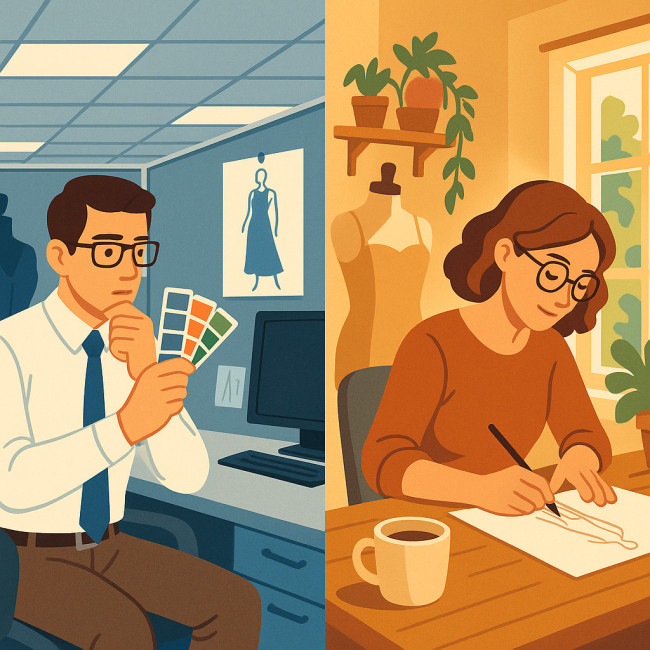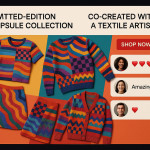Full-time or freelance? Comparing salary, royalties and autonomy for designers
Wondering whether to stay on payroll or jump into independent work? This guide compares salaries, royalty potential and day-to-day freedom so you can choose the right career model for your design talent.
At a glance: how full-time and freelance design careers differ
| Criteria | Full-time | Freelance |
|---|---|---|
| Average annual earnings (USD) | $58 000 – $97 000* | $65 000 – $105 000* |
| Royalty share | Rare, 0 – 2 % | 5 – 12 % on licensed work |
| Paid benefits | Healthcare, PTO, gear budget | None, self-funded |
| Creative autonomy | Directed by brand style guide | Client mix of your choice |
| Job security | Stable paycheque | Income fluctuates |
| Scalability | Limited by pay grades | Can add retainers, courses, royalties |
*US Bureau of Labor Statistics median values plus UX salary benchmarks.
Salary comparison: why numbers differ
Full-time design positions
Corporate design salaries grow with seniority but also with sector. In-house fashion designers often start around $45 000 and climb toward $85 000 with five years' experience. UX or digital product designers begin closer to $75 000 and top six figures quickly thanks to tech stock plans.
Freelance and contract rates
You set your own price, yet market signals matter. A freelance clothing designer working per collection can earn $500 – $1 500 per finished style. Hourly rates sit near $60 for juniors and $120+ for specialists in 3D prototyping. Net income after taxes and software spend usually beats corporate pay once you pass 1 200 billable hours yearly.
- Benchmark peers through qualifying freelance clothing designers to avoid under-quoting.
- Package complex projects as sprints to stabilise cash flow.
Royalties: hidden income stream for independent creators
Full-time contracts rarely include royalty clauses: any IP you develop belongs to the employer. Freelancers, on the contrary, can license prints, patterns or product concepts and keep earning after delivery.
Typical royalty ranges
- Surface pattern or textile licence: 5 – 8 % of wholesale price.
- Limited-edition object designs: 8 – 12 % of net sales (object design royalty models).
- Digital asset kits (icons, mock-ups): 50 – 70 % on marketplace platforms.
The more niche your expertise, the higher your negotiating power. Designers who collaborate with factories often blend a flat design fee with backend profit share; learn how in fair profit splits with garment factories.
Autonomy and lifestyle impact

Picture two parallel mornings. On one side, an in-house designer navigates traffic, swipes a badge through security and boots up brand-locked templates beneath humming fluorescent tubes. On the other, a self-employed creative starts the day in a sun-splashed loft, arranging client calls around a mid-morning sketch session while fresh coffee steams beside a tablet. These scenarios capture more than aesthetic differences; they reveal how autonomy influences rhythm, environment and personal energy. Freedom is not solely about skipping a boss—it affects travel possibilities, family time and the psychological lift that comes from choosing projects aligned with your taste. Yet the same freedom can blur boundaries when deadlines collide or clients span time zones, turning evenings into final-file marathons. Evaluating autonomy therefore demands sober reflection rather than Instagram-filtered daydreams, balancing creative control against the discipline required to protect rest and revenue.
Schedule control
Full-time roles lock you into company calendars. Freelancers decide when to prototype, meet clients or take sabbaticals—as long as deadlines are met.
Creative freedom
Employees must follow established brand DNA. Independents pitch personal aesthetics to various clients and can showcase side projects on hubs like Artfolio's collaboration board for clothing designers.
Geographic flexibility
Remote contracts surged post-pandemic, yet visa or tax rules still bind staff positions. Freelancers can geo-target new regions swiftly with niche directory ads, mirroring tactics shared for culinary artists.
Cost of independence: taxes, tools and downtime
Freelancers shoulder self-employment tax, unpaid sick days and software licences. Build these items into your rate:
- 20 – 30 % for taxes and social charges.
- 5 – 10 % for hardware refresh and cloud storage.
- 10 % contingency for non-billable hours spent on marketing or admin.
Decision matrix: pick your best-fit model
Rate each factor below on a 1-to-5 scale for your situation, then total the columns.
| Factor | Weight | Full-time score | Freelance score |
|---|---|---|---|
| Need for steady income | 5 | ||
| Desire for creative control | 4 | ||
| Risk tolerance | 3 | ||
| Networking reach | 2 | ||
| Administrative patience | 1 |
Higher total points indicate the more suitable path.
Source : U.S. Bureau of Labor Statistics
Mini-quiz: test your independence readiness
FAQ
- Can I negotiate royalties while remaining full-time?
- Yes, but it is rare. You must secure a carve-out clause or limit the employer's work-for-hire scope.
- How long before a new freelancer reaches previous salary levels?
- Most designers recover their corporate income within 12–18 months if they maintain a 70 % utilisation rate and build a referral pipeline.
- Do freelancers still need professional liability insurance?
- Absolutely. It protects against copyright disputes and production errors that can cost more than a single project fee.
- What tools help stabilise freelance income?
- Retainer agreements, automated invoicing and live availability calendars keep cash flow predictable.
- Is hybrid work (part-time job plus side gigs) a viable path?
- Yes. A 3-day staff role can fund essentials while you grow licensable assets and client leads.
Take action
List your financial goals, rate your autonomy needs and complete the decision matrix above. Ready to explore independent gigs? Publish your updated portfolio today and pitch three potential clients before the week ends.
CTA: Want personalised rate benchmarks? Subscribe to our newsletter and receive the freelance pricing calculator template.











